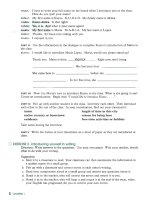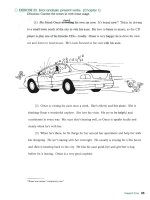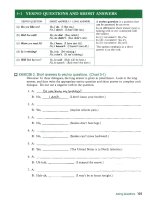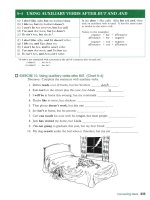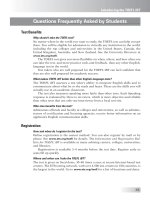Ship or sheep third edition part 9 ppsx
Bạn đang xem bản rút gọn của tài liệu. Xem và tải ngay bản đầy đủ của tài liệu tại đây (404.49 KB, 7 trang )
$.
UN|T l2 lstl girl
The worst
nurse
SIR HERBERT: NUTSe!
COLONEL BURTON:
Nurse! l'm thirstyl
SIR HERBERT:
Nurse! My head hurts!
COLONEL BURTON:
Nurse
Sherman always wears
such dirty
shirts.
SIR
HERBERT:
He never
arrives at work
early.
COLONEL
BURTON: He
and er
Nurse
Turner
weren't at work
on Thursdav,
were thev?
SIR HERBERT:
No, they weren't.
COLONEL
BURTON:
Nurse
Sherman is the
worst nurse in
the ward. isn't he. Sir
Herbert?
SIR
HERBERT: No, he
isn't,
Colonel Burton. He's
the worst nurse in the
world!
c
Practise reading
the dialogue
aloud. Record your
voice
to compare
your
production
of the target
sound with
the recording.
4
lntonation:
up or down
tags
Bls a
The intonation
of
question
tags is usually going
down.
This means the
speaker expects agreement.
Down
tags are
used a
lot
to create
agreement and rapport
between the speakers.
EXAMPLE
A: We were
at work
early, werent we?
B:Yes, we were.
Sometimes
the intonation
goes
up.
This
means
the speaker is not sure if
the information
is
correct and is asking
the listener
to check it. Before
an
up
tag there is
often a slight
pause
EXAMPLE
A: The nurses were
at work
on Thursday,
werent they?
B: Yes,
thev were.
UNIT
12
/sr/
girl
S
. r
b
Up or down?
Listen
and mark intonation
arrows on
the tagsSlexpects agreement) or
I
(not
sure). Number
I has been
done.
I
They werent walking
to work, rqdre
they?
not sure
2
Those dirfy
shirts were Nurse Tqlner's,
werent they?
3 The wards werert't
dtW,
were
they?
4
They werent
speaking Gelman, were
they?
5
Those
nurses were
thirsw, weren't
thev?
6 The Colonel
and Sir Herbert were
the
worst
patients
in the ward,
wererlt
they?
c Practise
reading the
questions
above with the same intonation.
Record
your
voice
to compare
your production
of the
intonation
with the
recording.
5 Spelling
Look
back over this unit
at
words
with the
target sound and write what
you
noticed
about how
to spell the sound
/srl.
lel acamera
48
-
Remember to telephone
your
sister
the day after tomorrow
for her birthday.
- And
dont
forget
to send
a
letter to
your
brother.
-
Shall I send
you
a
letter?
- Of
course. But dont
forget
to telephone as
soon
as you arrive.
I Target sound /a/
B20a a First
practise
the
sound /sl/
(see
page
43).
Listen
and repeat.
szou b
Make the same
sound
but very very
short
to
make
the target sound /e/.
Listen
and
repeat.
Bzoc
c
Listen and repeat both sounds
together:
/srl is long.
/e/
is
very short.
3
e
pair
ef binoculas
4 e
photegraph
efhe
mother
end fathe
5 a
book ebout
South americe
Cover the
words
on the left and
practise questions
and answers.
EXAMPLE
A: \Mhat's in
picture
two?
B:
e
glass
ef wate
2 lel in
unstressed
words
and
svllables
epil
rllt"ggggrc
a
photograph
ofher
mother
and
father
a book
about
South
America
Bzra
a
Listen
and
repeat. The
spelling has
been changed
in
the words on the
right
to show
you
when to use the
sound /e/.
*@
I e
photegraph
efBarbere
a
glass
of
water
2 e
glass
af wate
(
)
'
t;1
r@
Telling the time
Listen
and
repeat.
Look
at the clock.
\Mhat's
the time?
It's
six o'clock.
It's a
quarter
to seven.
Now practise
these.
EXAMPLE
A: \ /hat's
the time?
B: It's
e
quarte
te twelve.
UNIT 15
/e/ a carnera
4!f
Look
et the clock.
\Mhat's
the time?
It's six a'clock.
It's e
quarte
ta seven.
o
o
t,
3
;eading
ooeoooo@
aloud
Q
a
Read
this story aloud
or
visit
the
website
to
practise.
The
spelling
has
been changed
to showyou when to make
the sound /e/. Record
your
voice
to listen
to
your production
of the target sound.
Barbere
spent
Sateday aftenoon Iooking et e beautifal
book ebout South
emerice.
'I
want te
go
te South emerice,' she
said te
heself.
The next morning,
when Barbere woke
up
it wes
six e'clock, end he
brothes end
sistes
we
still esleep. Barbere looked
et them, end then
closed her
eyes egain.
Then she
quietly got
out
af
bed end started te
pack
he suitcase.
She took same comfeteble
clothes out ef tha cupbed.
She
packed
e
pair
ef binocules end he
siste's camera. She
packed
e
photegraph
ef
haself
end one
ef
he mothar
and fathe.
'I
musn't feget te have
same breaKest,'
she
said
ta haself.
Bet
then she
looked
et the
clock.
It wes
e
quarte
to seven.
'I'll
jest
drink e
glass
ef
wate,'
she said.
'e
glass
ef
wate,' she said.
'Wate,'
she said, end opened her
eyes.
She
wes
still in he
bed, and
he
brothes end sistes we laughing
et he.
'Tell
es what you we
dreaming ebout,'
they said te he.
Bat Barbere
didn't answe.
She
wes
thinking ebout he wondeful
iourney
te South americe.
f
unrr
tt lat acamera
szz
b
Weak
forms
Listen to the example of the weak form and the strong
form
of
uras.
H(AMPLE
Wes
she
dreaming?
This is the sound
/a/. This is the weak form
of uas.
Yes, she was.
This
is a different sound.
This is the strong form of uras
Then listen and repeat.
Wes
she thinking about South
America? Yes, she was.
Wa her brothers and sisters
asleep? Yes, they were.
De they like reading?
Yes,
they do.
Heve
you
read
about SouthAmerica?
Yes, I have.
Das
your
friend like reading? Yes, he does.
e
we working hard? Yes, we are.
Has
your
friend been to South America? Yes, he
has.
Can
you
swim?
Yes, I
can.
nzs
c
Tick
the
words a) or b) that
you
hear
in the sentences.
la)has
f
b)hes
I
2a)
can
I
b) cen
I
3a)was
I
b)was
I
4a)does
I
b)das
I
5a)am
I
b)em
I
6 a) them
tr
b) them
I
,U,NIT
l5
/e/ a
camera
ffi
-
-
3rOgU€
a Read this dialogue
and circle
the sound lal.The first
line has been done
for you.
'ltr:COlfl$
A: t'm going
6thd
libr&y.
B:
Can
you
buy
something for me
at the newsagent's?
A:
But the newsagent's is
a mile from the library.
B: No. Not
that newsagent's. Not
the one that's next
to the fish and
chip shop.
I mean
the one that's near
the butche/s.
A: Oh,
yes.
Well, what do
you
want?
B:
Some chocolates and
a
tin
of sweets and
an address boor.
ir:r b Listen
and check
your
answers, then
practise
reading
the dialogue
aloud. Record
your
voice to compare your
production
of the target
sound with
the recording.
t Spelling
Look
back over
this unit at words
with the
target sound, and write what
you
noticed about how
to spell the
sound /a/.
52
TI
REVIEW
Card
game:
Pick
up same sounds
TEST
Photocopy and cut out cards from all minimal
pairs
in Units B-13.
Shuffle the cards and
deal
them
face down all over
the
table.
Turn over
any two
cards
and read their sentences
aloud. If they are the
same
vowel
sound
you
keep them
and
you
continue
playing.
If those two
cards
aren't
the same
vowel
sound, turn them
face down again
and the
next
person plays.
Collect as many same
sound
pairs
as
you
can in a
time
limit,
e.g. ten
minutes.
You can use
a
dictionary if you
wish, but
you
don't
have to understand
every
word
to do this test.
nz-,
I
Foreachline
(I,2,3,4),firstlistentothewholeline.Thencircletheone
word -
or
part
of a word
-
that is
said twice. Note
that
meaning
is not
important in
this
exercise.
The
purpose
is
to
review
the sounds by
hearing
them
in
contrast.
Some of the
words
are rarely
used
in
everyday
English,
and this
is
shown by an asterisk*. Incomplete
words have the
rest
of the
word
written in
brackets, e.g.
foll(ow).
lvl
/ut
tDt
I Poll(y) Paul
pull
pool
Pearl
2 foll(ow)
fall
fooltull furl*
3 cod
cord could
cooed curd*
4
wad
ward would
wooed* word
Score
2
Circle the words with the
same vowel sound as 1-4.
I bird
t3'^/
bed were
rude
burn
early board
shirt
worst
shot
2 ball,
torn water
girl
all
glass
four log
talk nurse

